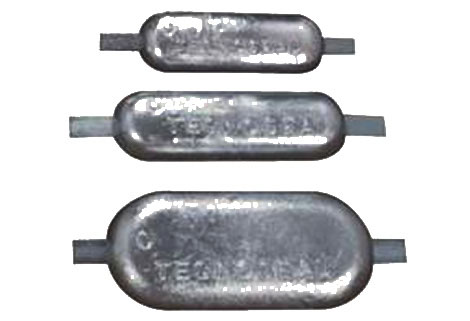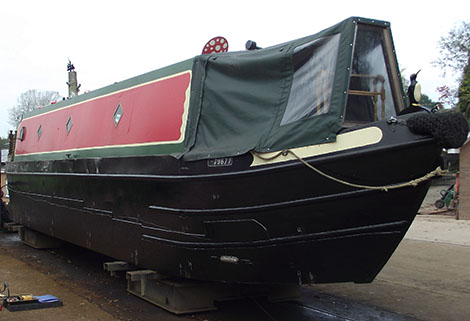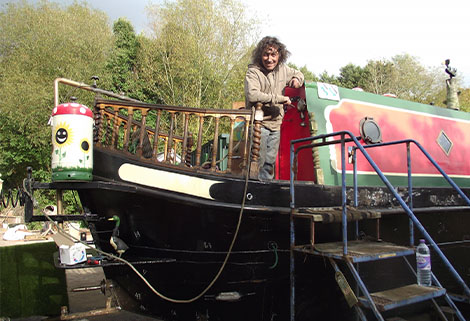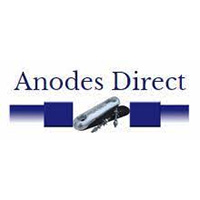talking anodes
Talking anodes for most people would consist of a series of questions. Every boat owner knows that anodes are needed, but what are they, exactly, what do they do, and why do we need them? What follows is an attempt to answer all of these questions.
 what is an anode?
what is an anode?
An anode is basically a plaque of sacrificial metal which is welded or bolted on to the underwater hull of a boat. Sacrificial because the anode corrodes through electrolysis more readily than the steel hull, thereby protecting your boat's hull for longer. With steel hulls, they should be welded on, for other hulls they can be bolted on.
how does it work?
There will be a series of different metals which make up the exterior of your boat – the hull, propellor, propellor shaft are made from various metals and alloys. When different or dissimilar metals are in direct contact, and immersed in water, the water acts as an electrolyte and an electron current is sent from one metal to another. This causes elctrolysis: one of the metals loses material in the form of ions (this metal is known as the anode) and another metal gains material (known as the cathode), and which metal loses the material depends upon how noble or corrosive-resistant it is. The noblest or most corrosive-resistant metal would be gold, while the least corrosive-resistant or the least noble is magnesium. Basically the strongest metals are protected and the weakest loses ions therefore breaks up (corrodes). The less resistant material becomes anodic and the more resistant material becomes cathodic.
 do I need anodes?
do I need anodes?
Of all the metals that exist in your boat, the weakest, least noble and therefore least corrosive-resistant one is your steel hull.
So it should be apparent from the above that if you did not have anodes fitted, and replaced regularly, the steel hull of your boat would become anodic and therefore corrode at a much greater rate.
For a canal boat (narrowboat) it is very advisable to get anodes which can be welded on to the hull, as drilling holes in steel below the waterline isn't the best option. The anode then becomes anodic, and the steel hull cathodic - which means it won't rust so quickly.
what sort of anode do I need for a canal boat?
Anodes are manufactured in zinc, aluminium or magnesium. For narrow boat owners, wide beams and other steel hulled canal boats, magnesium is the preferred material. Zinc is used for sea going boats, and aluminium for brackish water. (Brackish water is water having more salinity than freshwater, but not as much as seawater. It may result from mixing seawater with fresh water together, as in estuaries and tidal rivers). Of these, aluminium is lighter (therefore cheaper to install) and less costly than zinc.
 choosing your anodes
choosing your anodes
Make sure your anodes are fitted correctly and purchased from a reputable supplier. You will need professional advice about size of anodes, placement and quantity. It is not a good idea to overload the hull with anodes as this can have a detrimental effect on paintwork.
Remember, the anodes are added to your boat to sacrifice themselves, in order to protect other metals. If the anodes are not corroding further investigation would be required as the anodes once fitted and stable should start to show some sign of corrosion soon after.
In summary, make sure you buy anodes from a reputable dealer. Get the right sort for your boat. Get professional advice on size and placement. And get somebody to weld them on to your boat. When blacking or painting your boat, make sure you go round the anode, as painting over it would prevent it from doing its job.
Keep an eye on your anodes, and your hull will look after itself.
 Anodes Direct provide anodes of various materials to commercial and leisure craft throughout the UK and Europe. We specialise in providing marine anodes sourced only from the best manufacturers including Tecnoseal, MME, MG Duff, UK Anodes, Performance Metals, Piranha, Vetus, Side Power, Gori, Bruntons & Darglow. Zinc for Sea Water, Aluminium for Brackish Water, Magnesium for Fresh Water. We are always ready to advise and help, so do get in touch!
Anodes Direct provide anodes of various materials to commercial and leisure craft throughout the UK and Europe. We specialise in providing marine anodes sourced only from the best manufacturers including Tecnoseal, MME, MG Duff, UK Anodes, Performance Metals, Piranha, Vetus, Side Power, Gori, Bruntons & Darglow. Zinc for Sea Water, Aluminium for Brackish Water, Magnesium for Fresh Water. We are always ready to advise and help, so do get in touch!
Tel: 01621 743540 or 07787 566816 Write Visit
